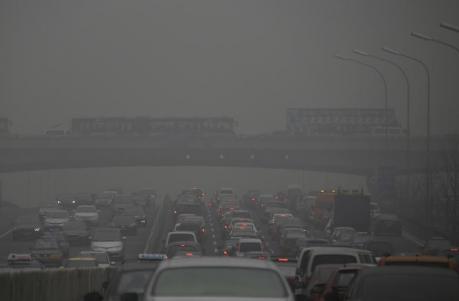New car engines emit more harmful particles than predecessors: study
Date: 28-Nov-13
Country: BELGIUM
Author: Barbara Lewis

Cars drive on and below Guomao Bridge on a heavily hazy day in
Beijing January 30, 2013.
Photo: Jason Lee
New-generation petrol engines of passenger cars emit about 1,000 times more particles, including carcinogens, than traditional petrol engines, a study by German researchers showed.
Faced with strict CO2 limits, carmakers have downsized engines to cut emissions and new gasoline direct injection (GDI) petrol engines may be in almost all new petrol cars sold in Europe by the end of the decade, the Brussels-based Transport & Environment think-tank said in a research paper on Wednesday.
However, Germany's TUeV Nord independent vehicle researchers said in a study that GDI engines emit about 1,000 times more particles, including harmful carcinogens, than conventional petrol engines, and 10 times more than new diesel engines.
Increased emissions of harmful substances are caused by GDI engines operating with higher pressure in their cylinders, tending to produce a greater amount of the particles, according to Hanover-based TUeV Nord.
"Cars are the largest source of air pollution in Europe's cities and 90 percent of European citizens are already exposed to harmful levels of particle pollution," Greg Archer, clean vehicles manager at Transport & Environment, said in the report.
"More fuel-efficient, lower CO2 GDI engines would be a great innovation if they did not emit harmful particles. These particles can be eliminated for the price of a hands-free kit," Archer said.
(Reporting by Barbara Lewis; writing by Andreas Cremer; editing by David Evans)
![]()
© Thomson Reuters 2013 All rights reserved